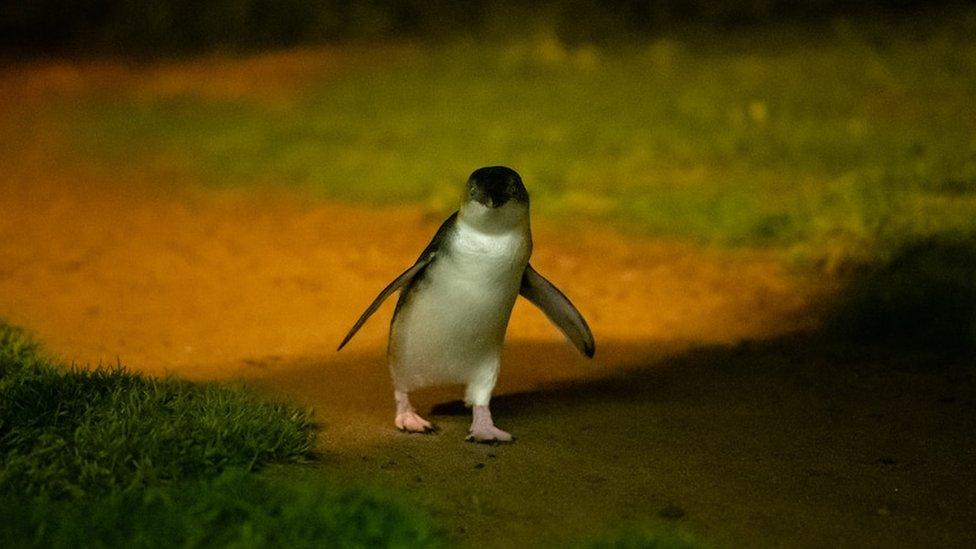Phillip Island: Penguin population increases in number
- Published
- comments

It's good news from 'Penguin Island'.
Phillip Island - also known as Penguin Island - off the south coast of Australia, is celebrating a record-breaking number of penguins.
Experts from the Phillip Island Nature Parks recently counted 5,440 little penguins crossing Penguin Parade beach in under one hour.
That's up from the previous record, set in May this year, of 5,219 - the highest number recorded since counts began in 1968.
Conservation work paying off
Little penguins arriving at sunset, back from a busy day's feeding on anchovies and sardines out at sea
The island is home to 40,000 of the flightless birds in total, the world's largest colony of little penguins.
And it's a popular place for visitors from the mainland, who come each day to watch the penguins return at sunset from feeding in the ocean.
But recording this many hopping across the beach in such little time is unheard of.
It's good news for the conservationists who have been working hard to save these little guys. In the mid-1980's the population had dropped to around 12,000.
"If you'd asked me this time last year if we would have 5,000 penguins crossing the beach, I'd say 'no way'," said research technical officer Paula Wasiak.
"This is indicating that our research-led conservation work that we're doing, minimising a lot of these threats and maximising their habitat is having a great pay-off."
The La Ni帽a effect
Besides the conservation work that has been going on for a long time to create a safe and happy habitat for the penguins, experts think that repeated La Ni帽a weather patterns have had an effect too.
These weather patterns in the region effect the conditions of the penguins habitat, which is why experts think the population is doing so well right now.
"The location of fish is dependent on oceanic conditions like storm activity, so when conditions are ideal, we tend to find fish close to shore and they're easier to catch for the penguins," Ms Wasiak said.
It refers to the periodic cooling of ocean surface temperatures in the Pacific.
La Ni帽a events occur every 3 to 5 years.
It causes a variation in weather patterns, sea temperature and winds.
Penguins like to feed on sardines and anchovies, and the booming population and the healthy weights of the chicks suggests they are getting plenty of food.
"The chicks are a good weight, that's indicating that food is nice and close to the colony."
Previous evidence appears to show that the penguins on Phillip Island are more successful breeding in La Ni帽a years, so it's good news for everyone... except the sardines, maybe!
- Published8 June 2018
- Published27 October 2022
- Published27 October 2022
